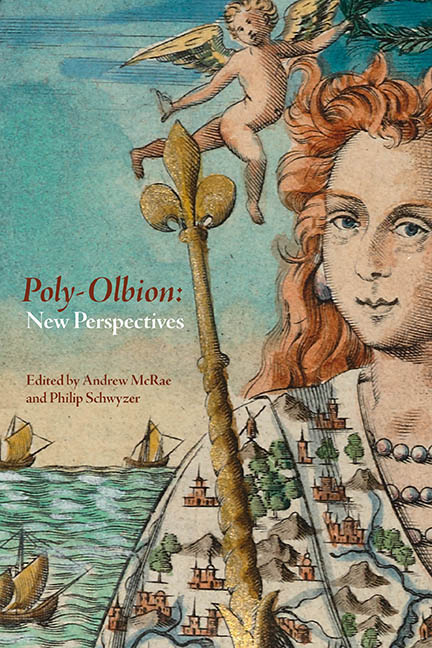Introduction
Published online by Cambridge University Press: 27 March 2020
Summary
Poly-Olbion (1612/22), the collaborative work of the poet Michael Drayton, the legal scholar John Selden, and the engraver William Hole, ranks among the most remarkable literary productions of early modern England, and arguably among the most important. An ambitious and idiosyncratic survey of the history, topography, and ecology of England and Wales – ranging in its preoccupations from the supernatural conception of Merlin to the curious habits of beavers, and from celebrations of martial glory to laments over the diminishment of woodlands – the book seems determined to pack all of national and natural history between its covers. In the course of thirty songs, Drayton's Muse traverses a varying landscape in which personified rivers, hills, and forests sing of past glories and disasters, pursuing local and regional rivalries whilst propounding – implicitly and explicitly – an idiosyncratic and heterogeneous vision of Britain. For all its variety, the poem is as remarkable for what it leaves out as for what it contains; among its notable omissions are the name of King James I, the entire country of Scotland, and any concession to the tastes of a Jacobean reading public whose ignorance Drayton never tires of lambasting.
This is the first ever volume of essays on Poly-Olbion, and a reflection of the work's increasing prominence in scholarship on the literature and culture of early modern England. With its dual focus on England and Wales and its British rhetoric and ambitions, the poem has long been central to critical studies of early modern nationhood and nationalism. In the last decade it has also assumed a central place in discussions of pre-modern approaches to ecological sustainability and environmental degradation. Recent scholarship on the history of the book and early modern paratexts has provided the ground for a fresh appreciation of Poly-Olbion's busy, multivocal mise-en-page. This collection of essays on Poly-Olbion reflects the extent to which Drayton's preoccupations have become our own.
POLY-OLBION IN ITS TIME
However much it may seem to speak to twenty-first-century concerns, Poly-Olbion, like any literary work, is a product of its time. Yet the ‘time’ of the poem is unusually difficult to pin down. Drayton's pursuit of what he ultimately came to describe as ‘This strange Herculean toyle’ (30.342) extended over a period of at least twenty-five years, possibly a good deal longer.
- Type
- Chapter
- Information
- Poly-Olbion: New Perspectives , pp. 1 - 16Publisher: Boydell & BrewerPrint publication year: 2020



